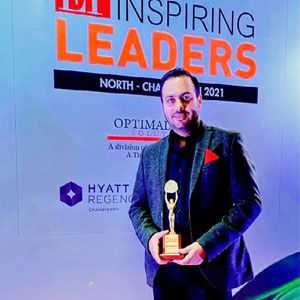
The humble bicycle has evolved from a utility vehicle into a statement of lifestyle, fitness, and sustainability. No longer defined by the monochrome roadsters of a bygone era, today’s buyers demand vibrant aesthetics, engineered ergonomics, and performance-driven innovation. In this landscape, manufacturers grapple with catering to a hyper-segmented market while maintaining scale, quality, and originality in design. However, for OEMs like Hippo Cycles, this shift has been more of a validation of its decades-long philosophy, that every bicycle must earn its place, not on a production line, but in the life of the rider.
From Sheet Metal to Specialized Frames
The origin of Hippo Cycles traces back to the late 1960s, when Ravi Industries began producing basic sheet metal components for bicycles during a time when most bicycle parts were still being imported into India. As the national call for indigenization grew stronger, the Mahajan family, now in its third generation of leadership, expanded the business into full-fledged bicycle component manufacturing. What started with handle lugs and seat posts gradually evolved into complete frames and fully assembled bicycles. The transition wasn’t just a shift in product line, it was a leap into product philosophy.
Hippo Cycles, the group’s flagship bicycle brand launched in the early 2000s, emerged not from imitation but from a consistent commitment to original design. Every Hippo model is a product of its in-house R&D and Design Center, where aesthetics, geometry, and materials converge. More than 150 models are currently in circulation across India, ranging from kids’ bicycles and mountain bikes to purpose-built orthopedic and senior-friendly models.
Listening as a Core Capability
Hippo Cycles’ approach to product development is simple, that design is never static. Feedback loops from across the
distribution channel, dealers, retailers, fitters, and end users, fuel incremental innovations. These insights serve not just as suggestions, but as live data points for kaizen-driven development. Whether it’s adapting frame geometries, tweaking paint finishes, or introducing new materials, the company treats user feedback as a continuous input for engineering action.
This constant dialogue with the market enables it to stay ahead of the curve, especially in segments such as electric bicycles (e-bikes), where technology and user expectations evolve rapidly.
Having entered the e-bike segment as early as 2013, the company is no stranger to the complexities of electric drivetrains, lithium-ion integration, and now, developments in hydrogen-powered alternatives. Its current e-bike portfolio includes cargo and last-mile delivery models and is poised for expansion into new categories that support both urban utility and wellness applications.
Quality Systems that Scale without Compromise
Hippo Cycles' manufacturing campus, sprawling over 230,000 square feet, operates with production lines that blend automation with skilled human oversight. Daily output surpasses 3,000 bicycles, but capacity has never come at the expense of compliance or consistency. It maintains ISO-aligned processes across vendor management, production, and post-production inspection. Standard Operating Procedures (SOPs) are deeply embedded across the supply chain with every product component traceable through barcoded systems.
The quality assurance department employs a multi-tier inspection model that includes patrol checks, pre-dispatch audits, and real-time reporting via ERP platforms. The presence of internal audits and vendor development programs further tightens the loop on quality. “Our marketing teams regularly conduct surveys with end customers to stay updated on changing preferences in colors, combinations, and emerging market trends”, says Nalin Mahajan, Director (Sales/Marketing Strategic Business Development), Hippo Cycles . “In addition, both our R&D and marketing teams frequently attend national and international trade fairs to remain abreast of the latest developments in the industry”, Nalin adds.
Every Hippo model is a product of its in-house R&D and Design Center, where aesthetics, geometry, and materials converge
Sustainability Engineered In
The company’s 500 KVA solar power plant supplies a significant portion of its energy requirements, reducing reliance on non-renewables. Wastewater is processed through an in-house ETP plant, treated, and reused. Paper usage has been minimized through complete ERP integration and app-based field operations. More importantly, the company actively promotes cycling as a sustainable urban mobility solution. Further embedding sustainability into its product strategy, Hippo Cycles has developed orthopedic models tailored for differently-abled and elderly riders.
While the company currently serves the domestic market through a distribution network of over 700 dealers and digital platforms, its next growth phase is aimed at global markets. It aims at establishing its own brand footprint overseas, particularly in segments like high-end e-bikes, wellness-oriented models, and cargo bicycles for emerging urban logistics.
Moreover, the R&D efforts are diversifying into wellness products and children’s recreational equipment. An untapped category the company is actively exploring is bicycles designed specifically for elderly users. As India’s population ages and the conversation around senior mobility gains traction, it sees this segment as both a business opportunity and a public health contribution. In an industry where performance and personalization are no longer optional, Hippo Cycles can power the wheels of a modern, mobile, and sustainable future.
Nalin Mahajan, Director (Sales/Marketing Strategic Business Development)
Nalin Mahajan brings over 25 years of experience to the helm of Hippo Cycles’ commercial and brand strategy. He formally joined the family business in 1998 after completing his MBA with a dual specialization in Finance and Marketing, representing the third generation of leadership at Ravi Industries. He is also a former chairman of the Ludhiana chapter of Round Table India (LIRT 2022). He combines academic rigour with hands-on industry experience and his leadership is rooted in data-driven decision-making and a strong customer orientation. In addition, he has been recognized with the Economic Times Inspiring Leaders Certificate of Appreciation.
We use cookies to ensure you get the best experience on our website. Read more...